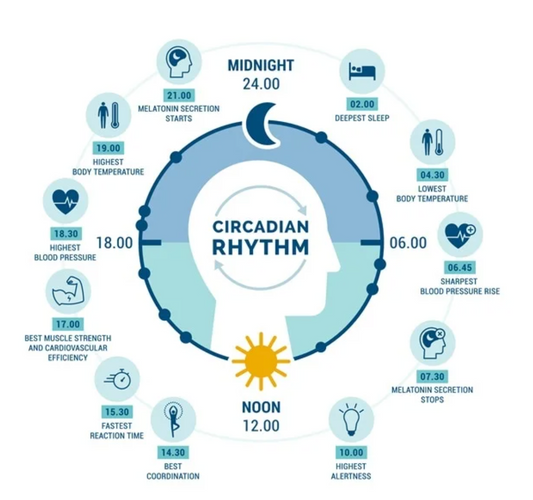We all have a ‘master-clock’ in our brain and peripheral clocks in every organ, from fat cells to your pancreas!
- Organs function differently (in sync) during the day than at night
- Digestive enzymes & hormones ebb & flow naturally throughout the day
- Metabolic rate / Absorption of calories alters throughout the day
- Thermogenesis (internal heat production) is more prevalent during daylight hours
- Round-the-clock snacking as detrimental to health/weight as artificial light exposure at night.
- Anything you eat after 6pm, you’ll wear!
The classic phase markers for measuring the timing of circadian rhythm are: - melatonin secretion
- core body temperature
- cortisol
Other physiological changes influenced by your circadian rhythm include heart rate and many cellular processes, including oxidative stress, cell metabolism, immune and inflammatory responses and even epigenetic modification.
In a recent study, those who finished eating early lost 25 percent more weight than later eaters. Another study found that eating a larger breakfast was more conducive to weight loss, compared with a larger dinner — adding to the evidence that the timing of meals is important.
Beyond weight management, doctors have long known that the time of day you take a drug can influence its potency. Part of this effect could be that the liver is better at detoxifying at certain times of day.
Shift-work or chronic jetlag have profound consequences on circadian and metabolic events in the body. Studies have shown that animals forced to eat during their resting period show increased body mass and altered expression of metabolic genes.
In humans, shift-work that favours irregular eating times is associated with altered insulin sensitivity and higher body mass. Shift-work also leads to increased metabolic risks for cardio-metabolic syndrome, hypertension, inflammation.
SLEEP-WAKE CYCLE
When there is less light (evenings), your body begins to increase production of melatonin to aid sleep. As we get older, the melatonin in our bodies starts decreasing, so we wake up earlier and earlier. The change begins in our thirties. A study from Oxford University states that the ideal wakeup time when we’re in our twenties is 9:30 a.m.; in our thirties, 8 a.m.; in our forties, 7:30 a.m.; in our fifties, 7 a.m.; and in our sixties, 6:30 a.m. This means, of course, we need to adjust our bedtime to match our wakeup time to get the rest we need. The general recommendation for sleep is 7-9 hours for adults and
A short powernap during the day does not negatively impact your circadian rhythms.
WORKING HOURS:
The best time to start work is 2.5 to 3 hours after you wake up. That’s when we’re at our most alert. For someone in their twenties, that’s around noon!
EXERCISE:
The optimal time to work out is around 4-5pm, as this is when we’re at our peak strength and lung function.
EATING:
People in their fifties and beyond should eat dinner earlier to leave optimal time to digest (and avoid heartburn).
ALCOHOL:
As we get older, our liver function decreases. If you’re going to enjoy an alcoholic beverage, you want to have it when the liver is functioning at its peak. For most ages, it’s best to give your body at least four hours to process alcohol before bedtime.
In general, getting out of sync with your circadian rhythm can cause a rise in your blood pressure, increased hunger hormones, stress hormones and blood glucose, all of which can be detrimental to our health.
Evolution dictates ‘nourish by day and fast at night.’
The same meal eaten after dark may elicit a 20-70% higher insulin response than the same meal eaten earlier. The energy used to digest food also halves when we eat at night compared with the morning.
Food for thought!
























